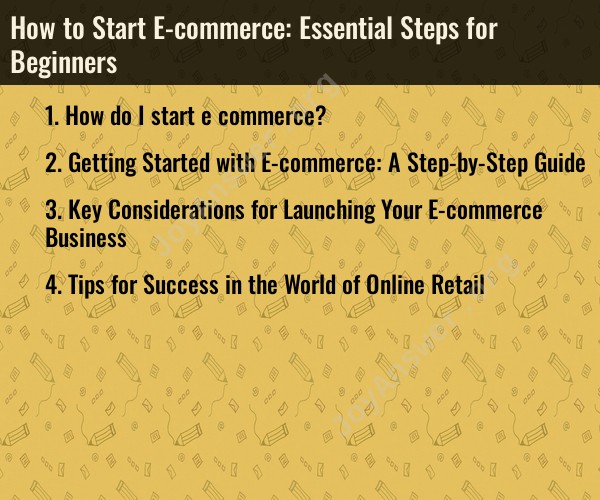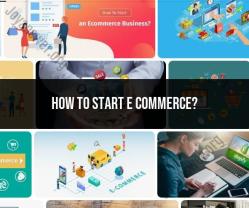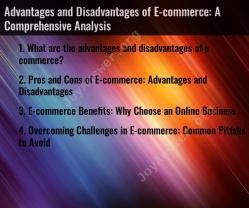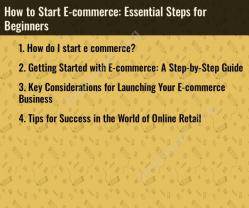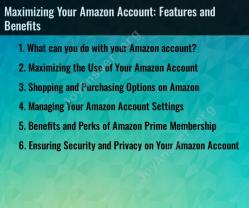How do I start e commerce?
Starting an e-commerce business can be a rewarding venture, but it requires careful planning and execution. Here are the essential steps to start an e-commerce business as a beginner:
1. Market Research and Niche Selection:
- Identify your target audience and niche. Research market trends, competitors, and customer preferences to find a profitable and underserved niche.
2. Business Plan:
- Create a comprehensive business plan that outlines your business model, products, pricing strategy, marketing plan, and financial projections.
3. Legal Structure and Registration:
- Choose a legal structure for your e-commerce business (e.g., sole proprietorship, LLC, corporation) and register it with the appropriate government authorities.
4. Domain Name and Hosting:
- Select a unique and relevant domain name for your online store. Choose a reliable web hosting provider to host your e-commerce website.
5. E-commerce Platform:
- Choose an e-commerce platform that suits your needs. Popular options include Shopify, WooCommerce (for WordPress), BigCommerce, and Magento.
6. Product Sourcing and Inventory:
- Decide how you'll source your products. Options include dropshipping, manufacturing your own products, or purchasing inventory. Ensure you have a clear inventory management system in place.
7. Website Design and Development:
- Design an attractive and user-friendly website. You can hire a web developer or use e-commerce platforms with customizable templates.
8. Payment Processing:
- Set up a secure payment gateway to accept online payments from customers. Common options include PayPal, Stripe, and Square.
9. Content and Product Listings:
- Create compelling product descriptions, high-quality images, and informative content for your website. Include details, pricing, and shipping information for each product.
10. Search Engine Optimization (SEO):- Optimize your website for search engines to improve its visibility on Google and other search platforms. Focus on keywords, meta tags, and high-quality content.
11. Legal Compliance:- Ensure your e-commerce business complies with local and international e-commerce laws. Address issues like privacy policies, terms of service, and compliance with consumer protection regulations.
12. Marketing and Promotion:- Develop a marketing strategy that includes social media, content marketing, email marketing, pay-per-click advertising, and search engine optimization. Build your online presence and engage with potential customers.
13. Shipping and Fulfillment:- Choose a shipping strategy and partner with reliable courier services. Offer multiple shipping options to customers. Consider the use of shipping software to streamline fulfillment.
14. Customer Support:- Provide excellent customer service, including accessible contact options and clear return and refund policies.
15. Analytics and Tracking:- Implement analytics tools to track website performance, customer behavior, and sales. Use data to make informed decisions and refine your strategies.
16. Launch Your E-commerce Website:- Test your website thoroughly to ensure it's functioning correctly, and then launch it for public access.
17. Monitor and Adapt:- Continuously monitor your e-commerce business's performance, gather customer feedback, and adapt your strategies to improve and grow.
Starting an e-commerce business takes time and effort, but with a clear plan and dedication, you can build a successful online store. Be prepared to learn, adapt, and stay updated on industry trends to stay competitive in the e-commerce market.
Getting Started with E-commerce: A Step-by-Step Guide
Starting an e-commerce business can be a daunting task, but it can also be very rewarding. With a little planning and effort, you can create a successful online store that generates sales and profits.
Here is a step-by-step guide to getting started with e-commerce:
- Choose a niche. What products or services do you want to sell? It is important to choose a niche that you are passionate about and that has a demand for products or services.
- Do your research. Once you have chosen a niche, it is important to do your research and understand the market. This includes understanding your target customers, your competitors, and the latest trends in your industry.
- Choose an e-commerce platform. There are a number of different e-commerce platforms available, such as Shopify, WooCommerce, and Magento. Choose a platform that is right for your needs and budget.
- Design your website. Your website is the storefront of your business, so it is important to make a good impression. Choose a design that is professional and user-friendly.
- Add products or services to your website. Be sure to include high-quality images and descriptions of your products or services.
- Set up payment processing. You need to be able to accept payments from customers. There are a number of different payment processing options available, such as PayPal, Stripe, and Square.
- Set up shipping. You need to be able to ship your products or services to customers. There are a number of different shipping options available, such as USPS, FedEx, and UPS.
- Promote your website. Once your website is up and running, you need to promote it so that people can find it. There are a number of different ways to promote your website, such as search engine optimization (SEO), social media marketing, and paid advertising.
Key Considerations for Launching Your E-commerce Business
When launching your e-commerce business, there are a number of key considerations to keep in mind, such as:
- Target market: Who are you selling to? What are their needs and wants?
- Competitive landscape: Who are your competitors? What are they doing well? What can you do better?
- Pricing: How will you price your products or services?
- Marketing and promotion: How will you reach your target market and promote your business?
- Customer service: How will you provide excellent customer service?
Tips for Success in the World of Online Retail
Here are a few tips for success in the world of online retail:
- Focus on the customer experience. Make sure that your website is easy to navigate and that your checkout process is smooth and easy.
- Offer excellent customer service. Be responsive to customer inquiries and complaints.
- Build a strong brand identity. Your brand is what sets you apart from your competitors. Make sure that your website and marketing materials reflect your brand identity.
- Keep up with the latest trends. The e-commerce landscape is constantly changing. Make sure that you are keeping up with the latest trends so that you can stay ahead of the competition.
- Invest in technology. The right technology can help you to streamline your business operations and improve the customer experience.
Starting an e-commerce business can be a lot of work, but it can also be very rewarding. By following the tips above, you can increase your chances of success.
